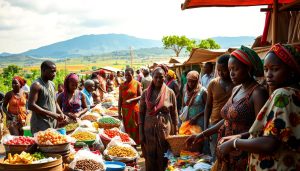Digital technologies in Africa are a beacon of hope and innovation. The African digital transformation aims to merge digital ecosystems with its economies and societies. This vision is to foster sustainable development.
The continent is filled with a strong desire to use digitalisation. It aims to boost economic growth and improve people’s lives. This is a remarkable move towards a better future.
Despite the focus on technology, Africa faces challenges in digital inclusion. Only about 37% of Africans use the internet. High internet costs, lack of digital skills, and limited electricity are major hurdles.
Our dedication and understanding of these challenges are key. They will unlock the full power of Africa’s digital technologies. This will make Africa a major player in the global digital world.
The digital world in Africa
Digital Earth Africa is changing Africa in big ways. It uses satellite data to help the environment and grow the economy. Three main projects are making a big difference, helping Africa’s future.
Digital Earth Africa’s Initiative for Sustainable Development
Digital Earth Africa uses satellite images to help the planet. It turns data into useful info for managing land, water, and cities. This helps growth that also protects the environment.
Empowering Through Earth Observation Data
Digital Earth Africa teaches people to use satellite data. It helps solve big problems like droughts and coastal erosion. This gives everyone the tools to make a better future.
Innovative Solutions for Environmental and Economic Challenges
Digital Earth Africa brings new ideas to tackle Africa’s problems. It uses advanced tools to understand floods and changes in nature. This makes sustainable growth possible.
Digital Transformation Policies in Africa
Africa’s digital transformation policies are key to its digital future. They are led by big plans and backed by the African Union. These plans aim to use digital tech to improve life and work across the continent.
At the heart of these policies are the African Digital Compact (ADC) and the Continental Artificial Intelligence Strategy (CAIS). They aim to make Africa prosperous by 2063. This vision is based on growth and sustainable development.
These policies focus on innovation. They are not just plans but actions. They use digital tech to tackle Africa’s challenges and seize its opportunities.
The goal is to create a digital future. This includes supporting creativity and tech growth. It makes Africa a great place for digital businesses and start-ups like Lelapa.
Negotiating Africa’s Digital Partnerships
The African Union plays a big role in digital partnerships. It works with tech leaders and regional groups. This helps spread best practices and new tech across Africa.
These partnerships are vital. They bring resources, expertise, and networks. This helps implement big digital changes.
Increasing Visibility of African Scholars
Supporting education and research is a key part of these policies. It helps African scholars shine. This is important for growing tech innovators and thinkers.
Projects like the Deep Learning Indaba showcase African science. They also inspire young Africans to use tech and AI to tackle big issues.
We think these efforts will greatly help Africa’s digital future. They support innovation and teamwork. They also empower Africa’s scholars. This makes Africa a major player in the digital world.
Challenges in Achieving Digital Connectivity
As we work towards better digital connectivity in Africa, we face many challenges. These are mainly about internet penetration and getting technology to everyone. These issues help us understand why some areas are left behind in digital inclusion.
One big problem is money. Internet is expensive, which stops people in poor areas from getting online. The cost of data centres and supercomputers for AI is too high. This stops many from joining the digital world, limiting digital inclusion.
- High installation and maintenance costs for broadband networks.
- Limited availability of digital literacy programs which are essential for utilising technology effectively.
- Need for substantial investments in both human and technological resources to improve internet penetration.
We need to tackle these problems head-on to grow together digitally. The benefits of digital connectivity are huge. It can help the economy and education, but we must work hard to break down technology barriers.
Africa can become a smart, connected economy. By cutting costs, improving skills, and investing in tech, we can beat these challenges. This is key to building a strong digital base for Africa’s future.
A Framework for Digital Transformation in Sub-Saharan Africa
We see the urgent need for digital change in Sub-Saharan Africa. We aim to close the connectivity gap, boost digital infrastructure, and grow the tech workforce. Our strategy involves key steps across the region.
Closing the Digital Connectivity Gap
To tackle the connectivity gap, we must improve mobile internet access in Sub-Saharan Africa. By making digital services more reliable and affordable, we help the region’s digital world grow. This lets more people and businesses join the digital economy.
Investing in Open Digital Public Infrastructure
Investing in open digital public infrastructure is key for lasting growth. We support the creation of strong, safe digital platforms for public services. This encourages partnerships between governments and the private sector, driving progress.
Building a Tech-Savvy Workforce
Creating a tech-savvy workforce is essential for digital growth in Sub-Saharan Africa. We focus on education and training in digital skills. This prepares young Africans for a digital future, sparking innovation from within the continent.
Impact of Broadband Accessibility and Affordability
Africa’s digital world is changing fast. Broadband and internet access are now seen as essential, not just nice to have. This shift is key to closing the digital gap and boosting African economies.
With better broadband, more people can reach out to the world. They can find new learning opportunities and get better healthcare. Making internet cheaper is also important. It helps by lowering the costs that stop many from getting online.
- Investment in infrastructure boosts broadband, helping local businesses and innovation.
- Affordable internet changes education and healthcare, bridging service gaps in underprivileged areas.
- Working with tech giants and local governments is key to lowering costs and making access wider.
By 2030, 88% of Africans will have smartphones. This will change how we use technology every day. It’s not just about being connected; it’s about opening up new chances for people to earn money.
More focus on making internet affordable helps people and the economy. It lifts communities and helps African GDP grow. The mix of better broadband and lower costs is a big step for Africa’s digital future.
Partnerships Strengthening Africa’s Digital Landscape
Collaborations are key in the digital age for Africa. The African Union Commission and the African Development Bank lead the way. They show how important it is to work together for digital growth.
This teamwork boosts tech progress and improves rules across the continent. It’s a big step forward.
Many sectors are joining forces, like the Smart Africa Alliance. These partnerships help speed up digital progress. They aim for a digital future that’s fair and sustainable for all.
The Role of the African Union Commission and the African Development Bank
- The African Union Commission sets the stage for digital policies. They focus on technology for everyone.
- The African Development Bank puts money into digital projects. This makes the digital world grow strong and far-reaching.
Smart Africa Alliance – A Regional Approach to Digital Transformation
- The Smart Africa Alliance shows what’s possible when countries work together. It’s a model for success.
- This alliance is all about teamwork and creativity. It helps build a strong digital community across Africa.
Improving Inclusive Connectivity and Digital Inclusion
We’re working hard to make digital access better in Africa. Our main goal is to balance inclusive connectivity and digital innovation. We’re tackling big issues like the gender digital divide and low digital literacy. These are key to growing inclusively.
Fixing the gender digital divide is more than just a technical problem. It’s about making tech opportunities fair for everyone. We’re working on:
- Supporting tech education for women and girls.
- Encouraging women to join the digital economy.
- Helping digitally trained women get jobs.
At the same time, we’re focusing on improving digital literacy. This helps people use technology well. Our plans include:
- Creating educational content that fits local needs.
- Running campaigns to show the value of digital skills.
- Working with schools to add digital skills to their lessons.
By taking these steps, we’re not just closing the gender digital divide. We’re building a culture of digital inclusion. This is key for strong, inclusive connectivity across Africa.
Creating a Vibrant Digital Economy in Africa
We aim to boost Africa’s digital economy. We want tech start-ups to create jobs and improve the economy. Our goal is to make Africa’s digital scene thrive, benefiting both locals and the world.
Transforming Africa’s digital scene is huge. Tech start-ups bring new solutions, jobs, and growth. They make digital spaces more inclusive for everyone.
- Innovation: We focus on sparking new ideas in tech start-ups. This leads to products and services that solve Africa’s problems.
- Job Creation: Growing tech start-ups mean more digital jobs. This opens up opportunities for people across Africa.
- Economic Growth: Each start-up adds to Africa’s digital economy. This makes the economy strong and sustainable.
We’re taking a big step to grow Africa’s digital economy. Our plan is to make sure everyone benefits. We’re committed to helping Africa change for the better.
Building In-Demand Digital Skills and Jobs
Africa is going through a big digital change. It’s very important to learn digital skills for our careers and for the economy. Tech education and training are key to making people ready for the job market.
Specialised tech courses are vital. They teach skills like coding, data analysis, and digital marketing. These courses mix practical training with theory, so learners get skills they can use.
Workforce development is more than just learning skills. It’s about using those skills in real jobs. This is where the real value lies.
- Innovative educational platforms that combine global tech trends with local market needs;
- Partnerships with tech giants to facilitate knowledge exchange and provide access to cutting-edge technology;
- Initiatives focusing on digital literacy to ensure inclusivity, for all in the tech sector.
Our goal is to use Earth observations to create useful tools. We also encourage coding for spatial analysis. These efforts are key to making Africa digitally strong.
By improving tech education and training, we help the job market. This makes Africa more important in the global digital world. Our focus on digital skills is essential for growth.
The Future of the Digital World in Africa
The digital world in Africa is set to grow fast, showing the continent’s energy and growth. It will be shaped by artificial intelligence, sustainable economies, and new digital technologies. These will help create strong, smart economies that benefit everyone.
Africa’s use of artificial intelligence is key to solving big social and economic problems. AI can change farming, healthcare, and education, making life better for many. But, we need good policies and rules to make this happen. Working together, we can make Africa a big player in the digital world, creating a fair and strong digital space.
The future looks bright for Africa in the digital world. With teamwork and shared goals, Africa will not just join in but lead. We’re excited to help make this vision real, believing in a future where technology and teamwork create a strong, fair digital economy.









